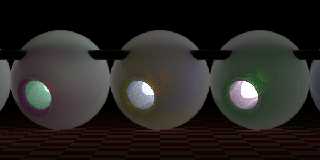 |
 |
|
 |
|
 |
|  |
|  |
|
 |
|
 |
|  |
|  |
|
 |
Yet another SSLT test render. This is a radiosity-only-lit scene.
(And again I had to fix a few more SSLT issues to get this scene to
render properly... *sigh*... still a long way to go I guess.)
Post a reply to this message
Attachments:
Download 'translucency_test.png' (217 KB)
Preview of image 'translucency_test.png'

|
 |
|  |
|  |
|
 |
|
 |
|  |
|  |
|
 |
On 2/25/2011 12:20 AM, clipka wrote:
> Yet another SSLT test render. This is a radiosity-only-lit scene.
>
> (And again I had to fix a few more SSLT issues to get this scene to
> render properly... *sigh*... still a long way to go I guess.)
Question regarding the Translucency specificer, does this replace, or
simply augment the current (As of RC3) style? Sometimes its nice to be
able to tweak both the scattering and the absorbing coefficients.
Post a reply to this message
|
 |
|  |
|  |
|
 |
|
 |
|  |
|  |
|
 |
Am 26.02.2011 00:35, schrieb Mike Raiford:
> Question regarding the Translucency specificer, does this replace, or
> simply augment the current (As of RC3) style? Sometimes its nice to be
> able to tweak both the scattering and the absorbing coefficients.
The old (RC3) syntax is gone. But you can still achieve the same results
via tweaking of the pigment and translucency - they're just a more
indirect (yet usually much easier) way of specifying the coefficients.
Post a reply to this message
|
 |
|  |
|  |
|
 |
|
 |
|  |
|  |
|
 |
On 2/25/2011 6:52 PM, clipka wrote:
> The old (RC3) syntax is gone. But you can still achieve the same results
> via tweaking of the pigment and translucency - they're just a more
> indirect (yet usually much easier) way of specifying the coefficients.
Ah, that means I'll have to adjust my scene again. Going back and
looking at the example you gave of the new syntax, looks like it will be
a snap to make the changes.
What is the effect of transmit or filter on the pigment, BTW. With the
current syntax, it gets a bit weird. It almost appears that there's a
bit of transparency along with the translucency on this scene, too (or
is that due to radiosity interacting?)
Very cool features. Love all of the work you have put into the 3.7
version. I'm actually starting to go back to some of my older scenes and
playing with some of the 3.7 features. I've also found that it's almost
essential to set the assumed_gamma to 1.0, and use srgb color values on
old scenes. Especially when working with elements in the scene added
post 3.7 ... Setting the version to 3.6 does get the colors the way they
were, but I found (especially with SSLT) that the shadows were way too
dark.
Post a reply to this message
|
 |
|  |
|  |
|
 |
|
 |
|  |
|  |
|
 |
Am 26.02.2011 02:09, schrieb Mike Raiford:
> What is the effect of transmit or filter on the pigment, BTW. With the
> current syntax, it gets a bit weird. It almost appears that there's a
> bit of transparency along with the translucency on this scene, too (or
> is that due to radiosity interacting?)
I haven't actually tried transmit & filter out yet; I'd expect it would
allow you to add transparency to a material.
Where material is very thin, or is highly translucent, there is indeed a
bit of transparency mixed in by the SSLT code anyway (in the next
release, that is), to account for the portion of light that isn't
scattered or absorbed at all, but passes straight through.
Post a reply to this message
|
 |
|  |
|  |
|
 |
|
 |
|  |
|  |
|
 |
On 2/25/2011 9:09 PM, clipka wrote:
> Am 26.02.2011 02:09, schrieb Mike Raiford:
>
>> What is the effect of transmit or filter on the pigment, BTW. With the
>> current syntax, it gets a bit weird. It almost appears that there's a
>> bit of transparency along with the translucency on this scene, too (or
>> is that due to radiosity interacting?)
>
> I haven't actually tried transmit & filter out yet; I'd expect it would
> allow you to add transparency to a material.
>
> Where material is very thin, or is highly translucent, there is indeed a
> bit of transparency mixed in by the SSLT code anyway (in the next
> release, that is), to account for the portion of light that isn't
> scattered or absorbed at all, but passes straight through.
Oh, cool :) So that was what I thought it was in "The Inner Light"! Nice.
So many new things to play with, so little time. Lots of new
pigment/texture patterns to play around with, too. Will the prox pattern
eventually come back in the future?
I was doing a fair bit of playing with the earlier betas... somewhere in
the 30's life got in the way. The RC's have really renewed my interest
again.
Post a reply to this message
|
 |
|  |
|  |
|
 |
|
 |
|  |
|  |
|
 |
Am 26.02.2011 04:28, schrieb Mike Raiford:
> Will the prox pattern
> eventually come back in the future?
I guess so. While it didn't work properly the way I tried to implement
it first time, I like the effect too much to give up on it. I can't tell
though /when/ I'll make another attempt - there's so much other stuff
I'm eager to implement as well.
Post a reply to this message
|
 |
|  |
|  |
|
 |
|
 |
|  |




![]()